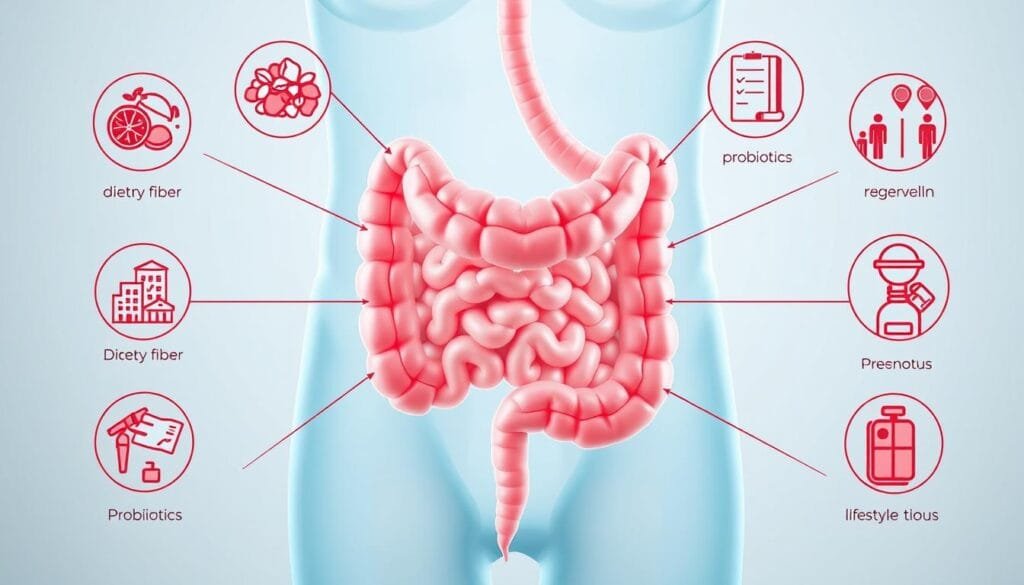Currently Empty: RM0.00
Could subtle discomfort signal something serious? Many dismiss bloating or irregular digestion as minor issues, but early detection of colon problems can be life-saving. Wellness Concept, a trusted Malaysian healthcare provider, highlights key symptoms to watch for—before they escalate.
Studies show that 90% of early-stage colorectal cancer patients survive five or more years with proper treatment. Yet, many ignore warning signs until it’s too late. From persistent cramps to unexplained weight loss, recognizing these signals early improves outcomes dramatically.
This guide covers symptoms, causes, and proactive steps to protect colon health. Wellness Concept offers expert screenings and care, making prevention accessible for everyone. Prioritizing health today ensures a healthier tomorrow.
Key Takeaways
- Early detection boosts survival rates for colorectal cancer.
- Persistent bloating or cramps may indicate colon issues.
- Wellness Concept provides screenings and expert care in Malaysia.
- Unexplained weight loss warrants medical attention.
- Proactive health management prevents serious complications.
Introduction to Colon Health
The colon plays a vital role in digestion, yet its health is often overlooked. As part of the large intestine, it absorbs water and electrolytes while forming waste for elimination. A well-functioning colon supports nutrient absorption and overall wellness.
Polyps in the colon may seem harmless, but some develop into colorectal cancer over time. The Cleveland Clinic notes that early screening detects these precancerous growths, dramatically improving outcomes. Regular check-ups can identify polyps before they become a serious disease.
Key risk factors include age (especially over 50), family history, and lifestyle habits like low-fiber diets. Smoking and excessive alcohol use also elevate risks. However, many colon issues are treatable when caught early through screenings.
In Malaysia, Wellness Concept provides expert screenings and patient education to promote proactive care. Their services help individuals understand their colon health and take preventive steps. Prioritizing early detection today can safeguard long-term well-being.
What Are the Signs of a Bad Colon?
Spotting unusual changes in digestion could be the first clue to colon health issues. While occasional discomfort is normal, persistent symptoms warrant attention. Early detection improves outcomes, especially for serious conditions like *colorectal cancer*.
Blood in the Stool or Rectal Bleeding
Bright red blood stool often points to rectal or lower colon bleeding. Dark, tarry stools may signal upper GI issues. While hemorrhoids cause intermittent bleeding, cancer-related bleeding is persistent and may include pain.
Persistent Changes in Bowel Habits
Diarrhea, constipation, or narrow “pencil-thin” stools lasting over two weeks are red flags. Feeling incomplete after bowel movements could indicate blockages. For mild irregularities, consider probiotics for constipation.
Abdominal Pain and Bloating
Chronic abdominal pain or cramping, especially with bloating, may suggest tumors or inflammation. Gas and discomfort after eating could also signal irritable bowel syndrome (IBS).
Unexplained Weight Loss and Fatigue
Sudden weight loss without diet changes often accompanies advanced colon issues. Cancer metabolism and appetite loss drain energy. Fatigue persists even with adequate rest.
| Symptom | Benign Cause | Serious Cause |
|---|---|---|
| Blood stool | Hemorrhoids | Colon cancer |
| Bowel changes | Food intolerance | Tumors |
| Abdominal pain | Gas | Blockage |
| Weight loss | Stress | Cancer |
“90% of early-stage colorectal cancer patients survive five or more years with timely treatment.”
Causes of Colon Problems
Many factors influence colon health, from daily habits to genetic predispositions. Some risks are preventable, while others require vigilant monitoring. Recognizing these triggers empowers proactive care.
Poor Diet and Lifestyle Habits
Processed meats and low-fiber diets slow digestion, increasing cancer risks. Sedentary lifestyles and obesity strain the colon’s function. Smoking and alcohol damage cells, accelerating abnormalities.
Chronic inflammation, like ulcerative colitis, often leads to polyp formation. The American Cancer Society notes these habits cause 50% of colorectal cases. Small changes—more veggies, less alcohol—can lower risks.
Genetic and Environmental Risk Factors
Familial adenomatous polyposis (FAP) and Lynch syndrome are hereditary conditions. They trigger rapid polyp growth, escalating colon rectal cancer risks. Family history doubles personal vulnerability.
Environmental toxins—pollution, pesticides—also contribute. While less common, they interact with genetic risk factors. Wellness Concept offers DNA testing to identify these hidden threats for Malaysians.
“Up to 30% of colorectal cancer patients have a family history of the disease.”
How Colon Issues Are Diagnosed
Modern diagnostics make identifying colon issues quicker and more precise than ever. From colonoscopy to advanced imaging, doctors use multiple tools to detect abnormalities early. These methods help distinguish benign concerns from serious conditions like cancer cells.
Colonoscopy and Biopsy
A colonoscopy lets doctors examine the rectum and colon directly. Patients prepare with a clear-liquid diet and laxatives. During the procedure, sedation ensures comfort while polyps are removed or biopsied.
Biopsies analyze tissue for cancer cells or genetic markers like KRAS. The American Cancer Society notes this step confirms diagnoses with over 95% accuracy. Most patients resume normal activities within a day.
Imaging Tests
For deeper insights, doctors may recommend:
- CT scans: Map tumors and check for metastasis.
- Ultrasounds: Assess pelvic pain or localized spread.
These non-invasive tools complement screening results. Virtual consultations often precede in-person tests, streamlining care.
“Regular colonoscopies reduce colorectal cancer deaths by 60–70% through early detection.”
Treatment Options for a Bad Colon
Modern medicine offers multiple ways to address colon health issues effectively. Tailored plans combine treatment methods, from medications to advanced procedures. Early action improves outcomes, especially when cancer spread is a concern.
Medications and Lifestyle Adjustments
Anti-inflammatory drugs help manage conditions like colitis. For aggressive cases, chemotherapy targets rapidly dividing cells. Patients often pair these with dietary changes—more fiber, less processed food.
Smoking cessation and regular exercise support recovery. Wellness Concept collaborates with nutritionists to create personalized plans. Small adjustments can significantly enhance colon function.
Surgical Interventions
When tumors or blockages occur, surgery becomes necessary. Minimally invasive robotic techniques reduce recovery time. Procedures like colectomy remove affected sections, sometimes requiring a stoma.
For advanced cancer spread, lymph node removal may be needed. Immunotherapy and targeted therapy offer newer alternatives. These treatments attack specific cells without harming healthy tissue.
“Robotic surgery reduces hospital stays by 30% compared to traditional methods.”
Wellness Concept partners with Malaysia’s top oncologists to provide cutting-edge care. Their integrated approach ensures patients receive the best treatment options available.
Preventing Colon Problems

Proactive steps today can safeguard your colon health for years to come. While some risk factors like genetics can’t be changed, many prevention strategies are within your control. Wellness Concept helps Malaysians implement these protective measures through education and accessible care.
Screening Recommendations
The American Cancer Society advises screening starting at age 45 for average-risk individuals. Those with family history or symptoms may need earlier testing. Regular checks can detect polyps before they develop into serious conditions.
| Test Type | Frequency | Best For |
|---|---|---|
| Colonoscopy | Every 10 years | Complete colon exam |
| Stool Tests | Yearly | Early blood detection |
| Flexible Sigmoidoscopy | Every 5 years | Lower colon check |
Wellness Concept offers affordable screening packages tailored to different needs and budgets. Their specialists help determine the right schedule based on personal health factors.
Diet and Exercise Tips
A diet rich in cruciferous vegetables and whole grains supports colon function. These foods provide fiber that promotes regularity and feeds beneficial gut bacteria. Limiting processed meats reduces cancer risks significantly.
Daily exercise improves gut motility and reduces inflammation. Just 30 minutes of moderate activity makes a difference. Simple changes like taking stairs or walking after meals add up over time.
“Adults who follow screening guidelines and healthy lifestyles reduce their colorectal cancer risk by up to 50%.”
Combining these approaches creates powerful prevention. Wellness Concept’s nutritionists and fitness experts help clients develop sustainable plans for lasting colon health.
When to See a Doctor
Certain symptoms demand immediate attention rather than a ‘wait-and-see’ approach. The American Cancer Society advises consulting a doctor for rectal bleeding lasting over 24 hours or unexplained weight loss exceeding 5% of body weight.
- Persistent abdominal pain or cramps lasting weeks
- Visible blood in stool or toilet paper
- Sudden shifts in bowel habits without dietary changes
Fatigue with pallor may signal occult bleeding causing anemia. Many dismiss these signs as stress or aging, but early evaluation improves outcomes dramatically.
Wellness Concept’s specialists are available via WhatsApp (+60123822655) for urgent queries. Remember: 90% of early-stage colorectal cases are treatable when caught promptly.
“Patients who seek care at first symptom onset have 3x higher survival rates than those who delay.”
Wellness Concept: Your Partner in Colon Health
In Malaysia, Wellness Concept bridges the gap between symptoms and solutions. Their team delivers expert cancer care and preventive services tailored to diverse needs. From advanced screenings to post-treatment support, they prioritize early action for lasting colon health.
Accessible Care When You Need It
Urgent cases receive same-week consultations. Reach out via WhatsApp for immediate assistance:
| Day | Hours |
|---|---|
| Monday–Friday | 9:30 AM – 6:30 PM |
| Saturday–Sunday | 10:00 AM – 5:00 PM |
“Timely screenings reduce colorectal mortality by 60%. Partnering with specialists saves lives.”
For appointments, message +60123822655. Wellness Concept makes proactive colon health management effortless across Malaysia.
Conclusion
Timely action transforms colon health outcomes dramatically. Key symptoms like rectal bleeding, persistent bowel changes, or unexplained weight loss should never be ignored. Early screening boosts survival rates for colorectal cancer to 90%.
Wellness Concept simplifies prevention with expert screenings in Malaysia. Their team helps detect issues before they escalate. A quick check-up today can save years of worry tomorrow.
Your colon health is worth protecting! Schedule a consultation via WhatsApp (+60123822655) and take control now.
FAQ
What symptoms indicate potential colon problems?
Common signs include blood in the stool, persistent diarrhea or constipation, abdominal pain, bloating, and unexplained weight loss. Fatigue and changes in bowel habits may also signal issues.
How does diet affect colon health?
A low-fiber, high-fat diet increases risk factors for colon rectal cancer and other conditions. Processed foods and alcohol can worsen inflammation, while fiber-rich foods support healthy bowel function.
When should someone consider a colonoscopy?
Screening is recommended starting at age 45 or earlier for those with risk factors like family history of cancer or symptoms such as rectal bleeding. Regular checks help detect polyps or cancer cells early.
Can ulcerative colitis lead to colorectal cancer?
Yes, chronic inflammation from ulcerative colitis raises the risk of cancer over time. Patients should follow screening guidelines and discuss treatment options with their doctor.
What role does exercise play in preventing colon cancer?
Physical activity improves digestion, reduces inflammation, and lowers risk factors. Aim for 30 minutes daily to support colon health and maintain a healthy weight.
Are there non-surgical treatment options for colon issues?
Medications, dietary changes, and managing conditions like diarrhea or constipation can help. Severe cases may require surgery to remove cancer or damaged tissue.
How often should cancer screening be done?
Most adults need a colonoscopy every 10 years. Those with risk factors may need tests more frequently. Stool-based tests are another option for early detection.



